Department of Security and Correction Science
About us
A word from the chair
The security sector world over is fundamental for the realization of a secure environment on which all other sectors thrive. Indeed the question of crime management and rehabilitation of those involved in crimes has always been the concern of states irrespective of the level of socio-cultural, political and economic advancement. State actors especially, the law makers, the law enforcement as well as mediation agencies, have come to acknowledge the role the security sector must play in the maintenance of law and order. With this in mind Kenyatta University became a major stockholder in security management by establish the Department of Security and Correction science and putting in place the necessary resources in order to facilitate training and research in security related areas. The department of security and correction science plays a key role in the training of professionals who end up attaining the competencies and skills that enable them to competently work in security related areas as well as carrying out research in order to inform policy making in the security sector. The department has a wide catchment area which includes both uniformed and non-uniformed professionals as well as nonprofessionals- in security and non-security establishments in addition to the non- employed who wish to further their studies in security management and thereby ultimately improving the security environment. The market for security managers is enormous owing to the fact that the security environment has continued to threaten all other sectors the world over.
Vision
The department envisages being a hub of teaching, research and service in Security and Correction science.
Mission
To train experts with skills and competencies in security management and correctional science which are relevant or crucial theoretically and practically in academics, policy making and at societal level.
Calendar of Events
...
External Examiners
...
News & Events
...
Programmes
a). Diploma in Security Management and Police Studies
Modes: Evening and weekend
Campuses: Main, City, Mombasa, Nakuru & Embu
Modes: DSVOL
Campuses: Main, City, Mombasa, Nakuru, Kisumu, Garissa, Kericho, Dadaab & Embu
Minimum requirements
Mean Grade of C (Plain) at KCSE or Division III at KCE OR Mean grade of C- (minus) with a certificate in police studies from a recognised institution.
Course Duration:Two years
b). Bachelor of Security Management and Policing Studies
The security sector is increasingly facing new challenges in the wake of the multiplicity of actors within the International System. This is occasioned by globalization, the ever changing demands of the national security environment, intra-state crimes, transnational crimes and the rise of the surveillance society. The Bachelor of Security Management (BSM) programme seeks to equip the trainees with broader knowledge and skills as well as professional expertise in mitigating crime and insecurity. The programme targets a wide range of personnel in the broad security sector and is especially oriented towards instilling management skills for those in the sector.
Modes: Evening and weekend
Campuses: Main, City, Mombasa, Nakuru & Embu
Modes: DSVOL
Campuses: Main, City, Mombasa, Nakuru, Kisumu, Garissa, Kericho, Dadaaab & Embu
Minimum requirements
Mean grade of C+ (plus) at KCSE or equivalent
Mean grade of C (Plain) at KCSE with a Diploma (passed with credit) in any field of study from a recognized institution. OR KACE or its equivalent with two (2) principals and a Subsidiary Pass OR Mean grade of C- at KCSE and progressed from Certificate to Diploma at Kenyatta University or any other recognized/accredited Institutions.
Course Duration:
Four years
c). Master of Security Management and Police Studies
This programme, aims at broadening the range of skills available to security personnel including, but not limited to, use of ICT in security management, global security analysis, communication, human relations, crime detection and investigation as well as security policy analysis and research. Equally, this programme provides opportunities for practitioners in the field and other eligible persons willing to further their studies in the field of security management. It shall an opportunity for police officers to enhance their understanding of policing, and stimulating research in policing issues. It also provides an opportunity for security managers to interrogate critical issues, thus enhancing capacity building.
Mode: Part-time: City, Embu, Nakuru, Mombasa Campuses.
Minimum Entry Requirements
Bachelor’s degree with at least Second Class Honours (Upper or Lower Division) from Kenyatta University or any other recognized University. Those with Second Class (Lower Division) and at least two (2) years relevant work experience may be considered.
Course Duration: Two Years
d). Doctor of Philosophy(Ph.D.) in Security Studies
Mode : Part-time: City, Embu, Nakuru, Mombasa Campuses
Minimum Entry Requirements
A holder of Master’s degree of Kenyatta University or any other recognized and accredited University with a course work component in any one of the following specializations:
Security Studies, Sociology, Criminology, Political Science, Peace Studies, African Studies, International Relations, Public Policy, Economics, Environmental Security, Military Science, Forensic Science.
Those with a Master’s degree in a closely related area of specialization and have at least three years postgraduate research or teaching experience in the subject area, may be considered.
Course Duration: Three Years
Research
...
Service Charter
...
- Details
Department of Security, Diplomacy and Peace Studies
About us
The contemporary international system is characterized by constant expansion of human activities such as trade and industry, transport and telecommunication, political process, migration, and culture. States are no longer the only significant actors on the global stage. International organizations, multinational corporations, and private groups have emerged as equally significant actors whose actions shape trends on the global scene. Critical issues of international politics, diplomacy, economics, finance, security, environment and media constantly arise on the global scene. Issues, events and policies at global levels affect both national levels as well as individuals. This contemporary world order continues to generate opportunities but also new complex challenges that go beyond national boundaries. International Relations programme at Kenyatta University is a rigorous, dynamic and multifaceted discipline that engages learners on issues that that characterize the contemporary world order. The programme is founded on theory and practice, aimed at producing sophisticated and analytical minds capable of rigorous scientific research on issues that are constantly emerging on the global scene. Graduates are also equipped with practical competencies for policy responses to the global issues.
Vision
The department aims to be a global centre for cutting-edge teaching and research in diplomacy and international affairs.
Mission
The mission of the department is to train highly skilled experts with competencies for careers in academia, research, policy and foreign and diplomatic affairs.
ChairPerson
A Word from the Chairperson
Dr. Boniface Muoka
Today, more than ever in world history, the need for scholars and practitioners in the interest of peace is higher than ever. The department offers a conducive teaching and learning environment for those interested in engaging in theory and practice of peace and conflict management. Our graduates are recruited to work with interpersonal and community relations in the diverse fields of law, community organizations, NGOs, FBOs, civil service and in the teaching profession.
External Examiners
...
Faculty Profile
- Dr. Boniface Muoka
- Dr. Stephen Handa
- Dr. Joseph Ndung’u Gathu
- Dr. Andrew Nyongesa Mung’ale
- DR. ICHANI XAVIER FRANCI
- Dr. Caroline Wandiri Mwea
- Dr. Gerald Peter Mutonyi
- Dr. Francis Mulu
- Dr. Zakayo Ndunda
- Joyce Ouda Okemo
- Dr. Hannah Muthoni Macharia
- Dr. Leah Nasimiyu Barasa
- Dr. Bernard Munyao Muiya
- Dr. Merecia Ann Musundi Sirera
- Dr. John Onyango Omboto
- Dr. Joseph Kimaru Karanja
- Dr. Ochieng’ George Oyombra
News & Events
Teaching for semester one 2023/2024 starts on Tuesday, 5th September 2023
Our PhD students
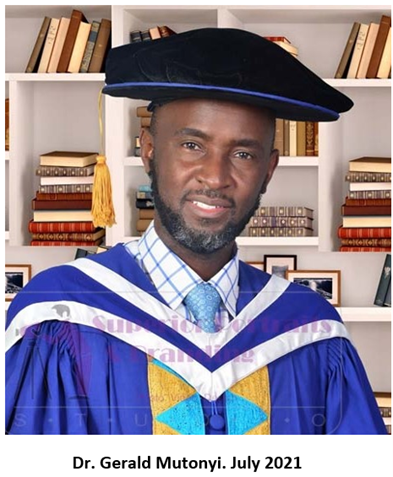 |
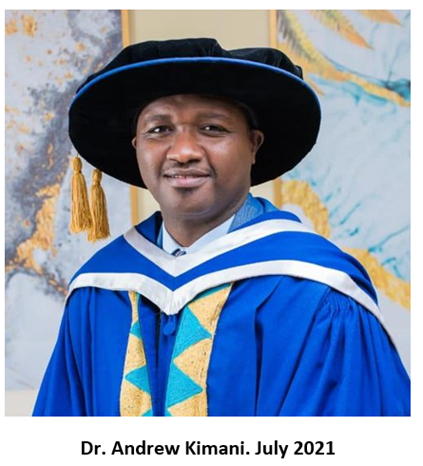 |
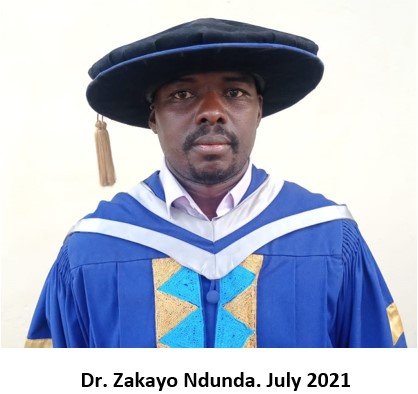 |
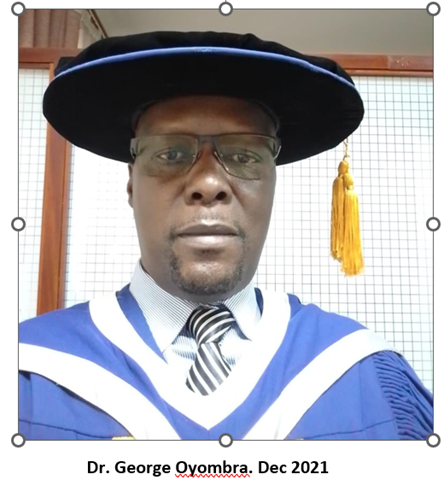 |
||
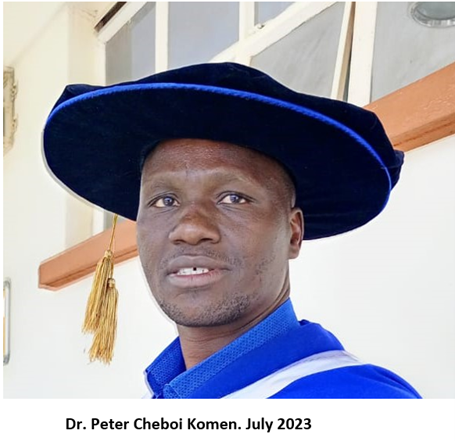 |
Programmes
a). Master of Arts in International Relations and Diplomacy
The Master of Arts in Diplomacy and International Relations is a unique programme that blends theory and practice in the areas international relations theory, diplomacy, International Political economy, Foreign policy analysis and formulation, global conflicts and gender issues in international Relations. The programme rigorously prepares those seeking to enter into academic and research careers as well as those interested advancing their professional competencies as diplomats, foreign policy experts, international governmental organizations, and international civil society and interest groups. Thus the programme aims at producing postgraduates grounded in theories and debates on international affairs; knowledge about international policy issues, global processes and actors. Our graduates are capable of critical analysis of contemporary international policy issues and with practical skills for policy formulation, analysis and advocacy, diplomatic negotiation, mediation, and diplomatic communication.
Modes : Full-time: Main Campus
Part-time: City, Nakuru, Mombasa, and Embu Campus
CEP: Main campus
DSVOL: Main, Mombasa and City Campuses
Minimum Entry Requirements
Bachelor of Arts (International Relations and Diplomacy OR Political Science) degree with at least Second Class Honours (Upper or Lower Division) from any recognized University.
Those with Bachelor of Arts degree in related disciplines such as History, Political Philosophy/Theory, International Law or Economics will be also be considered.
Course Duration: Two Years
b). Master of Arts in Peace and Conflict Management
Modes :Full-time: Main Campus
Part-time: City Campus
CEP: Main campus
DSVOL: Main, Mombasa and City Campuses
Minimum Entry Requirements
Bachelor’s degree with at least Second Class Honours (Upper or Lower Division) from Kenyatta University or any other recognized by the university senate. Those who are eligible to apply are fresh graduates in the disciplines of conflict and peace, political, development and gender studies, history, sociology, law, international relations, public policy and administration and personnel working with civil societies, government and the public sector interested in pursuing the discipline of peace and conflict.
Course Duration: Two Years
c). Doctor of Philosophy in Peace and Conflict Management
Modes : Full-time: Main Campus
Part-time: City , Nakuru, Embu and Mombasa Campus
Minimum Entry Requirements.
Holder of Master’s degree of Kenyatta University or equivalent qualifications from any other University recognized by Kenyatta University Senate as being an institution of comparable status to that of Kenyatta University with a course work component in any one of the following specializations: peace, conflict, political, development and gender studies, history, sociology, international relations, public policy and administration and any other related field.
Holder of a Master’s degree in a closely related area of specialization and has at least three years’ postgraduate research experience or teaching in the subject area, and can provide evidence of research capability.
Course Duration: Three years
d). Doctor of Philosophy in International Relations and Diplomacy
Modes :
Full-time: Main, Nakuru, Mombasa, Kericho and Embu Campus
Minimum Entry Requirements
Holders of Master of Arts (International Relations and Diplomacy or Political Science) degree or any related discipline from a recognized University by Senate.
Course Duration: Three years
a). Diploma in Security Management and Police Studies
Modes: Evening and weekend
Campuses: Main, City, Mombasa, Nakuru & Embu
Modes: DSVOL
Campuses: Main, City, Mombasa, Nakuru, Kisumu, Garissa, Kericho, Dadaab & Embu
Minimum requirements
Mean Grade of C (Plain) at KCSE or Division III at KCE OR Mean grade of C- (minus) with a certificate in police studies from a recognised institution.
Course Duration:Two years
b). Bachelor of Security Management and Policing Studies
The security sector is increasingly facing new challenges in the wake of the multiplicity of actors within the International System. This is occasioned by globalization, the ever changing demands of the national security environment, intra-state crimes, transnational crimes and the rise of the surveillance society. The Bachelor of Security Management (BSM) programme seeks to equip the trainees with broader knowledge and skills as well as professional expertise in mitigating crime and insecurity. The programme targets a wide range of personnel in the broad security sector and is especially oriented towards instilling management skills for those in the sector.
Modes: Evening and weekend
Campuses: Main, City, Mombasa, Nakuru & Embu
Modes: DSVOL
Campuses: Main, City, Mombasa, Nakuru, Kisumu, Garissa, Kericho, Dadaaab & Embu
Minimum requirements
Mean grade of C+ (plus) at KCSE or equivalent
Mean grade of C (Plain) at KCSE with a Diploma (passed with credit) in any field of study from a recognized institution. OR KACE or its equivalent with two (2) principals and a Subsidiary Pass OR Mean grade of C- at KCSE and progressed from Certificate to Diploma at Kenyatta University or any other recognized/accredited Institutions.
Course Duration:
Four years
c). Master of Security Management and Police Studies
This programme, aims at broadening the range of skills available to security personnel including, but not limited to, use of ICT in security management, global security analysis, communication, human relations, crime detection and investigation as well as security policy analysis and research. Equally, this programme provides opportunities for practitioners in the field and other eligible persons willing to further their studies in the field of security management. It shall an opportunity for police officers to enhance their understanding of policing, and stimulating research in policing issues. It also provides an opportunity for security managers to interrogate critical issues, thus enhancing capacity building.
Mode: Part-time: City, Embu, Nakuru, Mombasa Campuses.
Minimum Entry Requirements
Bachelor’s degree with at least Second Class Honours (Upper or Lower Division) from Kenyatta University or any other recognized University. Those with Second Class (Lower Division) and at least two (2) years relevant work experience may be considered.
Course Duration: Two Years
d). Doctor of Philosophy(Ph.D.) in Security Studies
Mode : Part-time: City, Embu, Nakuru, Mombasa Campuses
Minimum Entry Requirements
A holder of Master’s degree of Kenyatta University or any other recognized and accredited University with a course work component in any one of the following specializations:
Security Studies, Sociology, Criminology, Political Science, Peace Studies, African Studies, International Relations, Public Policy, Economics, Environmental Security, Military Science, Forensic Science.
Those with a Master’s degree in a closely related area of specialization and have at least three years postgraduate research or teaching experience in the subject area, may be considered.
Course Duration: Three Years
Research
..
Service Charter
- Details
Department of Conflict, Peace and Strategic Studies
About US
This is one of the departments in the School of Security, Diplomacy and Peace Studies. The department responds to the escalation of conflicts at various levels posing an imminent threat to human. The programmes in the department are tailor-made to produce graduates who have requisite problem solving and negotiating skills essential for building sustainable peace. The department is housed in the ultra-modern Directorate Complex, First Floor, with well-furnished offices and boardrooms for use in enhancing learning. The department boasts of having competent and committed personnel, who earnestly pursue academic excellence.
Uniqueness
The department of Conflict, Peace and Strategic Studies is one of its kind in the region, which combines peace and conflict with strategic studies, giving our students a niche in the global market.
Vision
The department aspires to become a centre of excellence in teaching, innovative research and institutional consultancy in conflict and peace studies in the region and beyond.
Mission
To enhance capacity building for beginners and practitioners, inculcating in them problem solving skills and competences in a competitive global market.
Objectives of the Department
- To be a leader in the training of manpower in Peace and Conflict in the region and beyond.
- To develop in learners an in depth understanding of the nature, dynamics and complexity of international security and development
- To equip learners with skills in problem solving and conflict management for use in their lives and in careers
- To elicit interest in learners in the interface between geopolitics, regional, security, conflict management, strategic leadership and new international order
- To develop a centre for conflict and conflict management, with international expertise to attract innovative research and institutional consultancy
Calender of Events
ChairPerson
A Word from the Chairperson
Dr. Boniface Muoka
Today, more than ever in world history, the need for scholars and practitioners in the interest of peace is higher than ever. The department offers a conducive teaching and learning environment for those interested in engaging in theory and practice of peace and conflict management. Our graduates are recruited to work with interpersonal and community relations in the diverse fields of law, community organizations, NGOs, FBOs, civil service and in the teaching profession.
Faculty Profile
News & Events
...
Programmes
Academic Programmes
- BSc. in Military Studies
- Master of Science in Strategic Studies
- Master of Arts in Peace and Conflict Management
- PhD in Peace and Conflict Management
- Masters Research Proposal Presentation
The students writing research projects in Peace and Conflict Management are scheduled to present their proposals to the departments on Thursday 31st March, 2016 from 9.00 am in the School of Security, Diplomacy and Peace Studies Boardroom
Research
...
- Details
Department of Conflict Resolution and International Relations
About us
The contemporary international system is characterized by constant expansion of human activities such as trade and industry, transport and telecommunication, political process, migration, and culture. States are no longer the only significant actors on the global stage. International organizations, multinational corporations, and private groups have emerged as equally significant actors whose actions shape trends on the global scene. Critical issues of international politics, diplomacy, economics, finance, security, environment and media constantly arise on the global scene. Issues, events and policies at global levels affect both national levels as well as individuals. This contemporary world order continues to generate opportunities but also new complex challenges that go beyond national boundaries. International Relations programme at Kenyatta University is a rigorous, dynamic and multifaceted discipline that engages learners on issues that that characterize the contemporary world order. The programme is founded on theory and practice, aimed at producing sophisticated and analytical minds capable of rigorous scientific research on issues that are constantly emerging on the global scene. Graduates are also equipped with practical competencies for policy responses to the global issues.
Vision
The department aims to be a global centre for cutting-edge teaching and research in diplomacy and international affairs.
Mission
The mission of the department is to train highly skilled experts with competencies for careers in academia, research, policy and foreign and diplomatic affairs.
ChairPerson
A Word from the Chairperson
Dr. Boniface Muoka
Today, more than ever in world history, the need for scholars and practitioners in the interest of peace is higher than ever. The department offers a conducive teaching and learning environment for those interested in engaging in theory and practice of peace and conflict management. Our graduates are recruited to work with interpersonal and community relations in the diverse fields of law, community organizations, NGOs, FBOs, civil service and in the teaching profession.
External Examiners
...
Faculty Profile
- Dr. Boniface Muoka
- Dr. Stephen Handa
- Dr. Joseph Ndung’u Gathu
- Dr. Andrew Nyongesa Mung’ale
- DR. ICHANI XAVIER FRANCI
- Dr. Caroline Wandiri Mwea
- Dr. Gerald Peter Mutonyi
- Dr. Francis Mulu
- Dr. Zakayo Ndunda
- Joyce Ouda Okemo
- Dr. Hannah Muthoni Macharia
- Dr. Leah Nasimiyu Barasa
- Dr. Bernard Munyao Muiya
- Dr. Merecia Ann Musundi Sirera
- Dr. John Onyango Omboto
- Dr. Joseph Kimaru Karanja
- Dr. Ochieng’ George Oyombra
News & Events
Teaching for semester one 2023/2024 starts on Tuesday, 5th September 2023
Our PhD students
 |
 |
 |
 |
||
 |
Programmes
a). Master of Arts in International Relations and Diplomacy
The Master of Arts in Diplomacy and International Relations is a unique programme that blends theory and practice in the areas international relations theory, diplomacy, International Political economy, Foreign policy analysis and formulation, global conflicts and gender issues in international Relations. The programme rigorously prepares those seeking to enter into academic and research careers as well as those interested advancing their professional competencies as diplomats, foreign policy experts, international governmental organizations, and international civil society and interest groups. Thus the programme aims at producing postgraduates grounded in theories and debates on international affairs; knowledge about international policy issues, global processes and actors. Our graduates are capable of critical analysis of contemporary international policy issues and with practical skills for policy formulation, analysis and advocacy, diplomatic negotiation, mediation, and diplomatic communication.
Modes : Full-time: Main Campus
Part-time: City, Nakuru, Mombasa, and Embu Campus
CEP: Main campus
DSVOL: Main, Mombasa and City Campuses
Minimum Entry Requirements
Bachelor of Arts (International Relations and Diplomacy OR Political Science) degree with at least Second Class Honours (Upper or Lower Division) from any recognized University.
Those with Bachelor of Arts degree in related disciplines such as History, Political Philosophy/Theory, International Law or Economics will be also be considered.
Course Duration: Two Years
b). Master of Arts in Peace and Conflict Management
Modes :Full-time: Main Campus
Part-time: City Campus
CEP: Main campus
DSVOL: Main, Mombasa and City Campuses
Minimum Entry Requirements
Bachelor’s degree with at least Second Class Honours (Upper or Lower Division) from Kenyatta University or any other recognized by the university senate. Those who are eligible to apply are fresh graduates in the disciplines of conflict and peace, political, development and gender studies, history, sociology, law, international relations, public policy and administration and personnel working with civil societies, government and the public sector interested in pursuing the discipline of peace and conflict.
Course Duration: Two Years
c). Doctor of Philosophy in Peace and Conflict Management
Modes : Full-time: Main Campus
Part-time: City , Nakuru, Embu and Mombasa Campus
Minimum Entry Requirements.
Holder of Master’s degree of Kenyatta University or equivalent qualifications from any other University recognized by Kenyatta University Senate as being an institution of comparable status to that of Kenyatta University with a course work component in any one of the following specializations: peace, conflict, political, development and gender studies, history, sociology, international relations, public policy and administration and any other related field.
Holder of a Master’s degree in a closely related area of specialization and has at least three years’ postgraduate research experience or teaching in the subject area, and can provide evidence of research capability.
Course Duration: Three years
d). Doctor of Philosophy in International Relations and Diplomacy
Modes :
Full-time: Main, Nakuru, Mombasa, Kericho and Embu Campus
Minimum Entry Requirements
Holders of Master of Arts (International Relations and Diplomacy or Political Science) degree or any related discipline from a recognized University by Senate.
Course Duration: Three years
a). Diploma in Security Management and Police Studies
Modes: Evening and weekend
Campuses: Main, City, Mombasa, Nakuru & Embu
Modes: DSVOL
Campuses: Main, City, Mombasa, Nakuru, Kisumu, Garissa, Kericho, Dadaab & Embu
Minimum requirements
Mean Grade of C (Plain) at KCSE or Division III at KCE OR Mean grade of C- (minus) with a certificate in police studies from a recognised institution.
Course Duration:Two years
b). Bachelor of Security Management and Policing Studies
The security sector is increasingly facing new challenges in the wake of the multiplicity of actors within the International System. This is occasioned by globalization, the ever changing demands of the national security environment, intra-state crimes, transnational crimes and the rise of the surveillance society. The Bachelor of Security Management (BSM) programme seeks to equip the trainees with broader knowledge and skills as well as professional expertise in mitigating crime and insecurity. The programme targets a wide range of personnel in the broad security sector and is especially oriented towards instilling management skills for those in the sector.
Modes: Evening and weekend
Campuses: Main, City, Mombasa, Nakuru & Embu
Modes: DSVOL
Campuses: Main, City, Mombasa, Nakuru, Kisumu, Garissa, Kericho, Dadaaab & Embu
Minimum requirements
Mean grade of C+ (plus) at KCSE or equivalent
Mean grade of C (Plain) at KCSE with a Diploma (passed with credit) in any field of study from a recognized institution. OR KACE or its equivalent with two (2) principals and a Subsidiary Pass OR Mean grade of C- at KCSE and progressed from Certificate to Diploma at Kenyatta University or any other recognized/accredited Institutions.
Course Duration:
Four years
c). Master of Security Management and Police Studies
This programme, aims at broadening the range of skills available to security personnel including, but not limited to, use of ICT in security management, global security analysis, communication, human relations, crime detection and investigation as well as security policy analysis and research. Equally, this programme provides opportunities for practitioners in the field and other eligible persons willing to further their studies in the field of security management. It shall an opportunity for police officers to enhance their understanding of policing, and stimulating research in policing issues. It also provides an opportunity for security managers to interrogate critical issues, thus enhancing capacity building.
Mode: Part-time: City, Embu, Nakuru, Mombasa Campuses.
Minimum Entry Requirements
Bachelor’s degree with at least Second Class Honours (Upper or Lower Division) from Kenyatta University or any other recognized University. Those with Second Class (Lower Division) and at least two (2) years relevant work experience may be considered.
Course Duration: Two Years
d). Doctor of Philosophy(Ph.D.) in Security Studies
Mode : Part-time: City, Embu, Nakuru, Mombasa Campuses
Minimum Entry Requirements
A holder of Master’s degree of Kenyatta University or any other recognized and accredited University with a course work component in any one of the following specializations:
Security Studies, Sociology, Criminology, Political Science, Peace Studies, African Studies, International Relations, Public Policy, Economics, Environmental Security, Military Science, Forensic Science.
Those with a Master’s degree in a closely related area of specialization and have at least three years postgraduate research or teaching experience in the subject area, may be considered.
Course Duration: Three Years
Research
..
Service Charter
- Details

